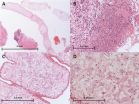Trouble with your boss? Own it
2014-11-21
(Press-News.org) EAST LANSING, Mich. --- Don't get along with your boss? Your job performance may actually improve if the two of you can come to grips with the poor relationship.
A new study led by Michigan State University business scholars finds that workers are more motivated if they and their supervisors see eye-to-eye about a bad relationship than if they have different views about their relationship. The findings are published in the Academy of Management Journal.
"Seeing eye-to-eye about the employee-supervisor relationship is equally, if not more important than the actual quality of the relationship," said Fadel Matta, lead investigator on the study and a management researcher in MSU's Broad College of Business.
Past research suggests workers and their bosses often have differing views about the quality of their relationship. Matta and his fellow researchers set out to examine whether that affects actual work engagement, or motivation.
It does. According to the MSU-led study of 280 employees and their bosses, motivation suffered when an employee believed he or she had a good relationship with the boss but the boss saw it differently. The finding held when the flip side was true and the boss believed the relationship was good but the subordinate did not. The two were surveyed separately, meaning the boss did not necessarily know how the employee felt about him or her, and vice versa.
Interestingly, employee motivation was higher (and the employee was more apt to go above and beyond his or her basic job duties) when the worker and supervisor saw eye-to-eye about the relationship, even when it was poor.
The study examined a wide range of employees - from cashiers to senior managers - in a host of industries, including automotive, retail and financial services. The employees and bosses were surveyed separately.
It's nearly impossible for a supervisor to have a good relationship with every employee -- there's only so much time and so many resources a boss can invest toward that goal -- but at the same time it's human inclination to want everyone to like you, Matta said.
Ultimately, it's important that supervisors and workers don't misrepresent how they feel about their relationship.
"Some people would say it's better to fake it, but our results indicate that the opposite is true," said Matta, a doctoral candidate in the Department of Management. "At the end of the day, it's better for everyone to know where they stand and how they feel about each other."
INFORMATION:
His co-researchers are Brent Scott, associate professor of management at MSU; Donald Conlon, Eli Broad Professor of Management at MSU; and Joel Koopman, assistant professor at the University of Cincinnati.
[Attachments] See images for this press release:

ELSE PRESS RELEASES FROM THIS DATE:
2014-11-21
SCOTTSVILLE, SOUTH AFRICA-- Worldwide, drought conditions, extreme temperatures, and high soil saline content all have negative effects on tomato crops. These natural processes reduce soil nutrient content and lifespan, result in reduced plant growth and yield, and ultimately translate to lower profits for tomato producers. As an alternative to unsustainable practices such as the use of synthetic fertilizers, producers are looking to environment-friendly soil ameliorants such as verimcompost leachate, an organic liquid produced from earthworm-digested material and casts ...
2014-11-21
TUSCON, AZ - Soil solarization, a process that uses solar radiation to rid the soil of pests, is most common in regions with high solar radiation and high temperatures during the summer season. An alternative to soil fumigation, the process is used either alone or in combination with fumigants. To accomplish solarization, solar radiation is used to passively heat moist soil covered with clear plastic sheeting, with the goal of increasing soil temperatures to the point where they are lethal to soilborne organisms. The effectiveness of solarization is based on the actual ...
2014-11-21
Quebec City, November 21, 2014--Scientists from Université Laval, the University of British Columbia and the University of Oxford have discovered a natural resistance gene against spruce budworm in the white spruce. The breakthrough, reported in The Plant Journal, paves the way to identifying and selecting naturally resistant trees to replant forests devastated by the destructive pest.
A research team composed of professors Éric Bauce, Joerg Bohlmann and John Mackay as well as their students and postdocs discovered the gene in spruces that had remained relatively ...
2014-11-21
Employees who work at small, locally owned businesses have the highest level of loyalty to their employers -- and for rural workers, size and ownership of their company figure even more into their commitment than job satisfaction does, according to Baylor University researchers.
Higher levels of commitment are associated with less absenteeism, lower turnover and less seeking of jobs outside the company. The study -- "Small, local and loyal: How firm attributes affect workers' organizational commitment" -- is published in the journal Local Economy.
"It's an interesting ...
2014-11-21
LA JOLLA, CA - November 20, 2014 - Scientists at The Scripps Research Institute (TSRI) have discovered how one gene is essential to hearing, uncovering a cause of deafness and suggesting new avenues for therapies.
The new study, published November 20 in the journal Neuron, shows how mutations in a gene called Tmie can cause deafness from birth. Underlining the critical nature of their findings, researchers were able to reintroduce the gene in mice and restore the process underpinning hearing.
"This raises hopes that we could, in principle, use gene-therapy approaches ...
2014-11-21
There are plenty of body parts that don't grow back when you lose them. Nails are an exception, and a new study published in the Proceedings of the National Academy of Sciences (PNAS) reveals some of the reasons why.
A team of USC Stem Cell researchers led by principal investigator Krzysztof Kobielak and co-first authors Yvonne Leung and Eve Kandyba has identified a new population of nail stem cells, which have the ability to either self-renew or undergo specialization or differentiation into multiple tissues.
To find these elusive stem cells, the team used a sophisticated ...
2014-11-21
Stress activates the immune system
The team focused mainly on a certain type of phagocytes, namely microglia. Under normal circumstances, they repair synapses between nerves cells in the brain and stimulate their growth. Once activated, however, microglia may damage nerve cells and trigger inflammation processes. The studies carried out in Bochum have shown that the more frequently microglia get triggered due to stress, the more they are inclined to remain in the destructive mode - a risk factor for mental diseases such as schizophrenia.
Susceptibility for stress effects ...
2014-11-21
A protein kinase or enzyme known as PKM2 has proven to control cell division, potentially providing a molecular basis for tumor diagnosis and treatment.
A study, led by Zhimin Lu, M.D., Ph.D., professor of neuro-oncology at The University of Texas MD Anderson Cancer Center, showcased the non-metabolic abilities of PKM2 (pyruvate kinase M2) in promoting tumor cell proliferation when cells produce more of the enzyme.
The study results were published in today's issue of Nature Communications.
Dr. Lu's group previously demonstrated that PKM2 controls gene expression ...
2014-11-21
Immunity is a thankless job. Though the army of cells known as the immune system continuously keeps us safe from a barrage of viruses, bacteria and even precancerous cells, we mainly notice it when something goes wrong: "Why did I get the flu this year even though I got vaccinated?" "Why does innocent pollen turn me into a red-eyed, sniffling mess?"
A new study from Johns Hopkins takes a big step toward answering this and other questions about immunity, shedding light on how the body recognizes enemies on the molecular level -- and how that process can go wrong. The results ...
2014-11-21
A genome of a rare species of tapeworm found living inside a patient's brain has been sequenced for the first time, in research published in the open access journal Genome Biology. The study provides insights into potential drug targets within the genome for future treatments.
Tapeworms are parasites that are most commonly found living in the gut, causing symptoms such as weakness, weight loss and abdominal pain. However, the larvae of some species of tapeworm are able to travel further afield to areas such as the eyes, the brain and spinal cord.
A 50-year-old man ...
LAST 30 PRESS RELEASES:
[Press-News.org] Trouble with your boss? Own it






